If you find yourself asking, what are the best strategy board games without wanting to spend hours researching – you’re in the right place! Check out our swift analysis and ranking of some of the most popular old and recent strategy board games!
Board games have been played since the dawn of civilization in Asia more than five thousand years ago. From the Chinese game of Go to the ancient Egyptian game of Senet.
Even in today’s predominantly digital world the pastime remains popular amongst both children and adults. The variety is endless, with something out there for everybody. While video games now comfortably outsell table top games we have also seen a bit of a boom since the turn of the millennium. More and more new games are being released onto the market, while the old classics are growing in popularity once more.
Best Strategy Board Games Review Table:
| Best Strategy Board Games | Game | Review | Rating | Get it Here |
|---|---|---|---|---|
| Chess |  | One of the world's oldest and most famous strategy games. |  (4.5 / 5) (4.5 / 5) | (paid link) |
| Backgammon | 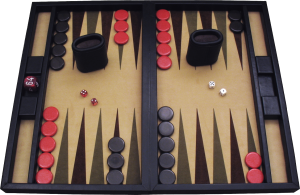 | A classic strategy game with a charming fusion of luck and skill. |  (3.5 / 5) (3.5 / 5) | (paid link) |
| Risk | 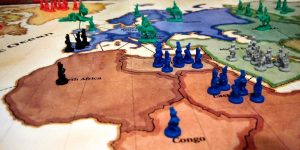 | One of the best known modern strategy games, and one of the most frustrating games as well. |  (3.5 / 5) (3.5 / 5) | (paid link) |
| Monopoly | 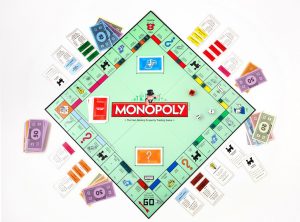 | A timless game worth pulling out on a rainy afternoon. |  (4 / 5) (4 / 5) | (paid link) |
| Settlers of Catan | 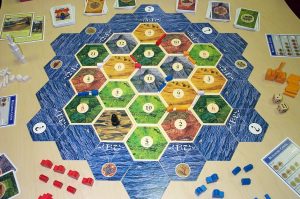 | One of my personal favorite complex strategy games. |  (4 / 5) (4 / 5) | (paid link) |
| Pandemic | 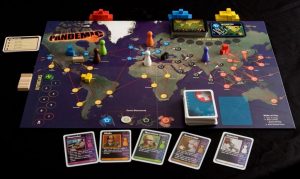 | Less competitive but very enjoyable co-op strategy game. |  (3.5 / 5) (3.5 / 5) | (paid link) |
| Game of Thrones Board Game | 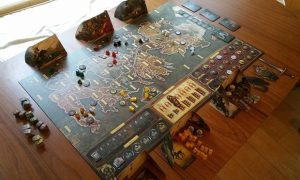 | Very popular recent strategy war and politics strategy game. |  (3.5 / 5) (3.5 / 5) | (paid link) |
| Diplomacy | 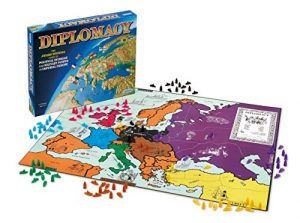 | Great interpersonal strategy game with no luck involved. |  (4 / 5) (4 / 5) | (paid link) |
| Puerto Rico | 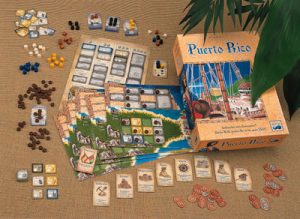 | Very fun strategic building/trading game with no luck involved - one of my favorites! |  (4 / 5) (4 / 5) | (paid link) |
| Stratego | 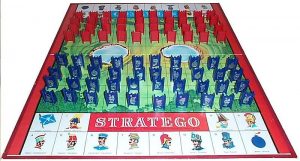 | Simple yet addicting strategy game that sets everyone on equal footing in a game of deception. |  (3.5 / 5) (3.5 / 5) | (paid link) |
How to Pick the Best Strategy Board Games for You
The answer to this question is more complicated than it might seem at first glance. People are individuals and everybody will have a different list of priorities. That said, there are a few standard factors which we can analyse to determine if a particular game is a suitable choice.
One of the most important qualities of a game has to be the level of difficulty. If the game is solvable to a great extent then our interest can quickly wane away. Easy to learn, but hard to master is a great selling point for any game. Take for example Connect Four, and Chess. Mastery of Chess is a lifetime’s work, yet can be played by a four year old child. Connect Four on the other hand is much simpler to solve, and is far less interesting.
The luck factor is a point to consider when buying a game which will be played by both children and adults. A child can quickly become frustrated if every game ends with a loss. By introducing randomness into the rules the weaker player has a much greater chance of victory. This can be in many forms, the most obvious being through the use of dice.
The amount of natural variance in a game is something else which can kill interest in a game which on the surface looks incredibly fun. If the game plays out almost the same every time then people are going to become bored very quickly. Games which have a lot of luck factor tend to score well on this metric. Whether through dice or drawing cards at random the path of the game will have many different possibilities.
One aspect which very few people will ever consider is called the “King Maker” effect. If during a multi player game it is obvious that a certain player no longer has any reasonable hope of victory, but their actions for the remainder of the game have a large role in determining the winner, then the potential for conflict can be high. Many board gamers take what they do seriously, and accusations of any kind of ganging up will quickly ruin the fun atmosphere.
Finally, I want to mention elimination and waiting times. If you’re sat around waiting for too long then boredom can creep in. Some games have a process of elimination, which if happens early in the game can result in a player feeling left out for too long. Also if the game is playable by several people at the same time waiting times until your turn comes around again can make a game unsuitable for the more impatient gamers.
These points are by no means a complete list, but they should give you plenty to consider when choosing a suitable game for your needs.
Let’s take a look at a selection of ten of the best strategy board games out there!
Top 10 Best Strategy Board Games List
Chess

Number of Players: 2
For Ages: 4+
This game needs no introduction to anybody who plays board games to any degree. One of the world’s very oldest games still being played today, with more than an estimated six hundred million players at the very least.
It is a game of abstract strategy played by two players, using a clock to determine the length of the game in a competitive environment. Probably the best example I can think of for an activity which takes ten minutes to learn but a lifetime to master.
Two armies of white and black pieces take turns to move one of their pieces on a checkered board of sixty four squares with the ultimate aim to capture the opponent’s king, known as delivering “check mate.” The strategy is incredibly complicated with more different games possible than there are stars in the known universe.
I recommend this game for both adults and children. Children can learn many things from chess, such as responsibility for their own actions to personal qualities such as patience and self control. Memory is also something which can be seriously tested during a game, which can help a child learn about future planning and judgement in general.
Adults may appreciate the fact that this is a game with no luck involved. Chess is a game of complete information where you are pitting your intellect against your opponent. There is no place to hide, and nobody else to blame for your shortcomings.
In the internet age there is always somebody to play of your own level, with a rating system making it clear exactly where you stand, and a choice of time controls from thirty seconds per player, to games lasting over seven hours.
Backgammon

Number of Players: 2
For Ages: 7+
Another old classic, reputed to be over five thousand years old in various similar forms.
Backgammon is a deceptively simple fusion of skill and luck. It has a tremendously high variance factor due to the dice, but don’t let that fool you into underestimating just how much skill is involved.
The game is turn based with an aim of moving all your checkers around the twenty four “point” board, and then “bearing off” until one player has no checkers left on the board. Each turn a player rolls two dice determining his choices of moves. When moving checkers it is possible to “hit” your opponent’s lone checkers sending them back to the beginning, which makes it more than a pure race around the board. There is plenty of interaction between the players.
A large part of the beauty of this game is the possibility to win occasional games against a player of a much higher skill level, even if over the long run you expect to lose the majority.
The social aspect is also something which many players value when playing face to face. Whether you’re playing a friendly game on a table outside a cafe in the sunshine, or in a tournament hall competing for prize money.
Overall I would say Backgammon is an interesting game, but may be a little dry for some people’s tastes, but don’t forget it’s been around for such a long length of time for a reason.
Risk

Number of Players: 2-6
For Ages: 8+
Risk is one of the best known modern strategy board games. Played on a map of the world divided up into territories, the players use armies to take control of the continents for added bonuses, ultimately striving to achieve world domination with all other players being eliminated. Dice are used to simulate combat with a card based system partly used to control the addition of new armies to the board.
This is an incredibly popular game which owes much of its success to the balanced inclusion of luck and skill. Not only that but it is possible to deviate from the goal of world domination choosing instead to play one of several variations such as a secret missions style where players may have to destroy an army of a particular colour, or capture various specified territories. There are many different options.
Some drawbacks to the game are the elimination process where a player out of the game early may have a long wait until the next round. Also the playing time if six players are competing can run to several hours.
Younger players may have an interest in one of the themed versions available, such as Star Wars, Lord of the Rings, and A Game of Thrones.
This is a quality choice, sure to be popular for a long time to come.
Monopoly

Number of Players: 2-6
For Ages: 8+
This is an all time classic being played by families around the kitchen table for more than eighty years. The rules are crystal clear making it easy for children to compete with adults on an equal footing. With the inclusion of dice and cards to introduce an element of chance this is another great choice for family entertainment.
Players move around the perimeter of the board landing on properties which they can purchase and then collect rent from other players who land on the same square on a later turn. Players with enough funds can add houses and hotels to any owned properties which increases the amount of rent charged.
As well as properties, some of the squares require the player to draw a card with either positive or negative consequences, as well as the famous “Go to jail” corner forcing a player to roll a double, pay a fine or miss three turns.
Once a player can not pay any debts due he is out of the game.
Some people say it’s purely a game of luck, while others claim to understand some strategy based on which properties are the best to own. It’s tough to argue one way or the other.
This game is timeless and always worth pulling out on a rainy afternoon.
Settlers of Catan

Number of Players: 3-4
For Ages: 10+
Only released in 1995 Settlers of Catan is a relative newcomer to the scene, but has quickly risen the ranks to one of the most popular board games currently on sale.
Players take the role of settlers building colonies on the island of Catan by collecting resources represented by cards. Resources are used to build settlements, cities, and connecting roads, and to encourage interaction between the players resource cards are permitted to be traded amongst themselves as they see fit.
The aim of the game is to collect ten victory points which are scored by various achievements such as owning settlements, cities, and the longest road.
One clever design feature of Settlers of Catan is that the hexagonal tiles which divide the terrains can be rearranged in a different manner for every game. The replayability factor is a huge bonus for the game’s fans.
Well worth a try in my opinion. Although a little complicated for some at first it soon becomes addictive once the strategies become clear. In my opinion this is one of the best strategy board games out there and a personal favorite of mine.
Pandemic

Number of Players: 2-4
For Ages: 10+
Pandemic is fundamentally different from the vast majority of board games in that the gameplay is purely cooperative rather than competitive. A great idea for groups of gamers with a history of frayed tempers over losing to one of their friends!
Gameplay centres on the players taking the role of a dispatcher, medic, operations specialist, scientist, or researcher. The aim is to find the cure for four diseases before a pandemic results.
On each turn a player has a choice between moving through the network of forty eight cities, sharing information with another player, treating a unit of infection, constructing a research lab. Finding the cure for a disease can occur by being in a city with a research and holding five player cards of the same colour.
Due to the initial success following the 2007 release three expansions are available, with four spin off stand alone versions, one of which is non-cooperative if that’s what you prefer, and another which takes place over a whole calender year.
Another great choice which suits those of a less competitive nature.
Game of Thrones Board Game

Number of Players: 3-6
For Ages: 13+
First released in 2003 this game’s success found a second wind following the huge popularity of the TV series. It isn’t necessary to be a fan of the books or programs to love this game though.
With very little luck involved, and a fair amount of complexity the gameplay is more suited to an older age range.
Each player choose one of the houses of Westeros and vies to ascend to the iron throne by means of war, spying and politics. Alliances will be forged and broken throughout the ten turns which make up the game, which adds a great deal of spice into the mix. Maybe best not to invite your more volatile friends around to play this one!
After ten rounds if nobody has claimed the iron throne then the player controlling the most territory is declared the winner.
Each turn consists of three phases. A Westeros phase for day to day activities and special events. A planning phase for giving orders. And an action phase for resolving the results of any orders and combat.
As is the norm for such popular games today there are a couple of expansion packs available to keep your interest piqued.
Diplomacy

Number of Players: 2-7
For Ages: 12+
In my eyes this is another old classic yet it’s not as well known as many other games which have stood the test of time. First released back in 1959 Diplomacy requires a combination of tactical and strategic skill with psychology and negotiations playing a large part of any victories. There is no element of chance in this game whatsoever. It is a pure strategic game with only skill deciding the winner.
The gameplay is based on the map of Europe before the outbreak of war in 1914, with some portions of North Africa and the Middle East also included. Players each take control of one of the great powers from the time.
Quite differently from the majority of board games, players don’t take their turns in order, but write down their decisions following a negotiation period and then all participant’s orders are carried out simultaneously. Following this the removal of armies takes place using a simple sets of rules.
The map is divided up into fifty six territories with thirty four having a supply center. The aim is to take control of these centers in order to resupply your armies.
Games can take as long as twelve hours, with some groups even opting to play via post, although I guess email is more the done thing these days.
For younger players, I think this game is a great way to learn interpersonal skills when playing with adults. A superb choice.
Puerto Rico

Number of Players: 3-5
For Ages: 12+
Puerto Rico is a multi award winning game from Germany. It’s one of those that seems complicated at first but very quickly becomes addictive once you get the hang of it.
Players take the role of a colonial governor in Puerto Rico and aim to score as many victory points as possible. This is done by growing crops which can either be sold for points or exchanged for doubloons which can in turn be used to construct buildings conferring some kind of advantage.
Each round players take it in turns to choose a role card of either “Trader” or “Builder.” This gives that player some kind of privilege making the decision and important one which can make or break an overall strategy.
All player’s current points score is kept a secret until the end of the game helping to keep people guessing and the tension high.
Recommendations for this game are to get as many players as possible which makes the strategy side much more interesting. Even though there is no luck involved it is still almost impossible to play the same game twice making it difficult to find a winning strategy that you can repeat on demand.
Stratego

Number of Players: 2
For Ages: 8+
Stratego is a modern variant of some older games with similar gameplay. Two armies of thirty three men plus six bombs and a flag are placed in your half of a board ten by ten squares. The aim is simple. Capture your opponents flag.
Sounds simple doesn’t it?
Each game piece has the rank printed on one side only so you can not see how your opponent has arranged his army.
Each player takes a turn of moving a member of his army one square forwards, backwards or to the side. The flag and bombs can not move. To attack another piece you simply move into that square and both players must declare the rank of their piece with the lowest ranked piece being removed from the board.
Several pieces have special properties making strategy far from simple. For example only rank eight sappers can defuse a bomb, or the spy which can beat the rank one Marshal only if he attacks, rather than gets attacked himself. Rank nine Scouts can move any distance in one turn but this obviously informs your opponent what the piece is without needing to attack it.
It’s not the most complicated or strategy rich game on the list but due to the variety of army set ups possible the replayability factor is decent. It’s also suitable for playing between adults and children on an equal footing.
Best Strategy Board Games: Wrapping It Up
Any of the games on this list will make a solid purchase but if I have to choose only one to recommend as the then it has to be Chess – to me it’s to date one of the best strategy board games.
The game simply has everything which will satisfy fans of the strategy genre. It is extremely rich in possibilities allowing you to really stamp your personality on your style of play. The amount of literature available is incredible giving you endless possibilities to find ways to improve.
The tournament scene for Chess is extremely healthy with categories for all abilities. Not only that but Chess online is extremely easy to get into with a simple rating system that ensures you can find suitable opponents when nobody is available to play you face to face.
I also seriously recommend the game as a way for young children to develop their problem solving abilities – and on that note we recently added an article covering the best board games for kids. Hopefully this list of some of the top strategy board games hits the spot for you – if you want to share any of your favorites feel free to do so below!
Leave a Reply